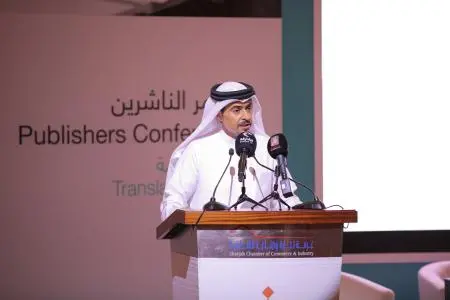PHOTO
- Matchmaking session draws unprecedented participation
Sharjah: The first day of the 9th Publishers Conference organised by Sharjah Book Authority (SBA), in the lead up to the 38th Sharjah International Book Fair (SIBF), has today (Sunday) witnessed discussions on the challenges and opportunities facing the industry, regionally and worldwide.
HE Ahmed bin Rakkad Al Ameri, Chairman of SBA, introduced the conference by stating the event’s main objective was to look at publishing in the most comprehensive manner, and from various perspectives, including that of the publisher, the reader, the author and the distributor.
He said: “We in Sharjah are working on different levels to promote the publishing industry based on the feedback we have received over the years. Our success can be gauged by the fact that we have received 2,900 applications for the SIBF Translation Grant last year. We have also successfully translated 1,200 books in the past few years. Last year, 3,000 matchmaking meetings were held with the participation of more than 400 publishing experts from all over the world.”
Al Ameri added: “We are gathered here to engage in a dialogue about the future of the publishing industry and study strategies to promote the global book industry. We are working on expanding the horizons of the publishers, which will open out more markets for them, taking into account new technology.”
Global Publishing: What’s Next for this Growing Industry
Moderating the day’s first session was publishing professional Dr Emad Elakehal, who started by thanking the vision and cultural efforts of His Highness Sheikh Dr. Sultan bin Muhammad Al Qasimi, Supreme Council Member and the Ruler of Sharjah. He was joined by Dominque Raccah, Founder and CEO, Sourcebooks (USA); Elliot Agyare, President, Ghana Book Publishers Association, and CEO, Smartline Publishing (Ghana); Jade Robertson, International Publishing Director, Austin Macauley Publishers (UK); and Peter Dowling, Immediate Past President, Publishers Association of New Zealand, and Publisher, Oratia Books (New Zealand).
Raccah noted that initiatives such as the SIBF Publishers Conference were key to a healthy publishing industry. “The global publishing industry today is better and healthier than ever before. We expected digitalisation to take over the printed books industry, but the opposite has happened. The reason is that books perform a different role. We have seen that 25 percent of books sold are given as gifts. Children’s books keep growing year on year. Around 80 percent of the sales are of physical books. I could not have predicted this a decade back. Communities have played an extraordinary role in this renaissance. Publishers should seek out innovative ways of reaching out to their audience.”
Elliot Agyare spoke about the impact of digitalisation and globalisation that was affecting the African publishing industry, partly because they had not yet learnt to monetise the huge mobile telephone penetration that the African continent is witnessing.
The power of social media and digital platforms to advertise and promote books was undeniable and publishers could ignore them only at their peril, said Jade Robertson.
Peter Dowling spoke about the explosion in bilingual and multicultural publishing in New Zealand. “While small and medium publishers are doing relatively well, globalisation has affected us acutely. However, educational publishing is doing well, digitally as well as in print. Children’s books too are growing all the time. Copyright laws are critical, and our government is in the process of framing them,” he said.
Taking Arabic Titles Global: How to do Business with Arab Publishers
Moderated by Julie Attrill, Manager of International Rights, Wiley (UK), and joined on the panel by Jayne Parsons, Publishing Director, Bloomsbury (UK); Mohammed Enad of Masaa Publishing and Distribution (Canada); Ramzi Ben Rhouma of Meskeliani Editions (Tunisia); and Faisal Al Nabouda, General Coordinator of Publishers Conference the second panel discussion centred on guidelines for publishers from other regions in dealing with Arab publishers and shed light on the SIBF Translation Grant.
The panellists agreed that the only way to avoid conflict between cultures was through literature, and the bridge for that was through translation. Faisal Al Nabouda outlined the features of the SIBF Translation Grant and how to participate.
The conference features an expanded, 3-day schedule this year and is being held at the taking place at the Sharjah Chamber of Commerce and Industry (SCCI) from October 27 – 29. It focuses on the latest publishing trends, emerging markets, digital strategies, threats and challenges.
-Ends-
© Press Release 2019Disclaimer: The contents of this press release was provided from an external third party provider. This website is not responsible for, and does not control, such external content. This content is provided on an “as is” and “as available” basis and has not been edited in any way. Neither this website nor our affiliates guarantee the accuracy of or endorse the views or opinions expressed in this press release.
The press release is provided for informational purposes only. The content does not provide tax, legal or investment advice or opinion regarding the suitability, value or profitability of any particular security, portfolio or investment strategy. Neither this website nor our affiliates shall be liable for any errors or inaccuracies in the content, or for any actions taken by you in reliance thereon. You expressly agree that your use of the information within this article is at your sole risk.
To the fullest extent permitted by applicable law, this website, its parent company, its subsidiaries, its affiliates and the respective shareholders, directors, officers, employees, agents, advertisers, content providers and licensors will not be liable (jointly or severally) to you for any direct, indirect, consequential, special, incidental, punitive or exemplary damages, including without limitation, lost profits, lost savings and lost revenues, whether in negligence, tort, contract or any other theory of liability, even if the parties have been advised of the possibility or could have foreseen any such damages.











